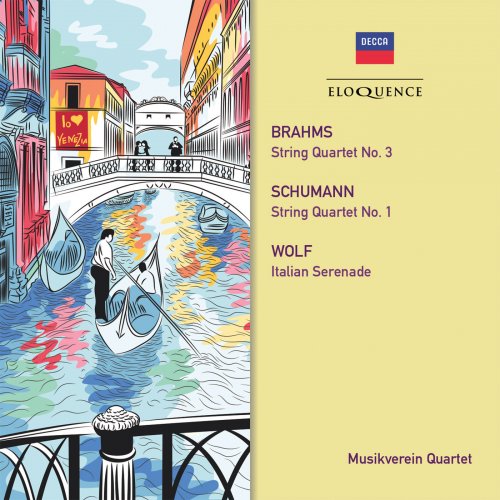
Musikverein Quartet - Brahms, Schumann: String Quartets (2015)
BAND/ARTIST: Musikverein Quartet
- Title: Brahms, Schumann: String Quartets
- Year Of Release: 2015
- Label: Universal Music Australia Pty. Ltd.
- Genre: Classical
- Quality: flac lossless (tracks)
- Total Time: 01:05:39
- Total Size: 294 mb
- WebSite: Album Preview
Tracklist
01. Brahms: String Quartet No.3 in B flat, Op.67-1. Vivace
02. Brahms: String Quartet No.3 in B flat, Op.67-2. Andante
03. Brahms: String Quartet No.3 in B flat, Op.67-3. Agitato (Allegretto non troppo)
04. Brahms: String Quartet No.3 in B flat, Op.67-4. Poco allegretto con variazioni-Doppio movimento
05. Schumann: String Quartet No.1 in A minor, Op.41 No.1-1. Introduzione (Andante espressivo-Allegro)
06. Schumann: String Quartet No.1 in A minor, Op.41 No.1-2. Scherzo (Presto)-Intermezzo
07. Schumann: String Quartet No.1 in A minor, Op.41 No.1-3. Adagio
08. Schumann: String Quartet No.1 in A minor, Op.41 No.1-4. Presto
09. Wolf: Italian Serenade in G major WW XV / 3
After the wealth of string quartets produced by the composers of High Classicism – Haydn, Mozart, Beethoven and Schubert – the leading figures of Romanticism were somewhat daunted by the expectations of their public. Felix Mendelssohn achieved a respectable total of six quartets but the three notable composers represented in this program managed only nine between them. Johannes Brahms, in particular, was paralysed by the thought that if he wrote a symphony or a quartet, people would measure it against Beethoven’s mighty creations. He kept a bust of Beethoven in his study and destroyed numerous works which he felt would not stand comparison with those of his hero. Robert Schumann was a slightly different case when, in 1842, he confronted chamber music head-on: he and Clara studied Haydn’s, Mozart’s and Beethoven’s quartets, playing them together on the piano, and in June and July Robert produced an extraordinarily unified trio of quartets, connected by key but distinct from each other. Hugo Wolf wrote relatively little chamber music but with the ‘Italian Serenade’ of 1887, in a few days Wolf produced one of the most delectable miniatures in the chamber literature: this free rondo dances in the most light-footed manner. Receiving their first international release on CD, all three works are here performed by the Musikverein Quartet, founded in 1973 by members of the Vienna Philharmonic.
01. Brahms: String Quartet No.3 in B flat, Op.67-1. Vivace
02. Brahms: String Quartet No.3 in B flat, Op.67-2. Andante
03. Brahms: String Quartet No.3 in B flat, Op.67-3. Agitato (Allegretto non troppo)
04. Brahms: String Quartet No.3 in B flat, Op.67-4. Poco allegretto con variazioni-Doppio movimento
05. Schumann: String Quartet No.1 in A minor, Op.41 No.1-1. Introduzione (Andante espressivo-Allegro)
06. Schumann: String Quartet No.1 in A minor, Op.41 No.1-2. Scherzo (Presto)-Intermezzo
07. Schumann: String Quartet No.1 in A minor, Op.41 No.1-3. Adagio
08. Schumann: String Quartet No.1 in A minor, Op.41 No.1-4. Presto
09. Wolf: Italian Serenade in G major WW XV / 3
After the wealth of string quartets produced by the composers of High Classicism – Haydn, Mozart, Beethoven and Schubert – the leading figures of Romanticism were somewhat daunted by the expectations of their public. Felix Mendelssohn achieved a respectable total of six quartets but the three notable composers represented in this program managed only nine between them. Johannes Brahms, in particular, was paralysed by the thought that if he wrote a symphony or a quartet, people would measure it against Beethoven’s mighty creations. He kept a bust of Beethoven in his study and destroyed numerous works which he felt would not stand comparison with those of his hero. Robert Schumann was a slightly different case when, in 1842, he confronted chamber music head-on: he and Clara studied Haydn’s, Mozart’s and Beethoven’s quartets, playing them together on the piano, and in June and July Robert produced an extraordinarily unified trio of quartets, connected by key but distinct from each other. Hugo Wolf wrote relatively little chamber music but with the ‘Italian Serenade’ of 1887, in a few days Wolf produced one of the most delectable miniatures in the chamber literature: this free rondo dances in the most light-footed manner. Receiving their first international release on CD, all three works are here performed by the Musikverein Quartet, founded in 1973 by members of the Vienna Philharmonic.
As a ISRA.CLOUD's PREMIUM member you will have the following benefits:
- Unlimited high speed downloads
- Download directly without waiting time
- Unlimited parallel downloads
- Support for download accelerators
- No advertising
- Resume broken downloads


